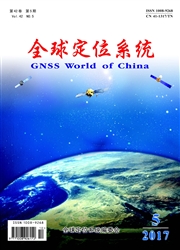

 中文摘要:
中文摘要:
为了满足高动态用户及强干扰条件下的应用需求,提出了一种基于卫星信号矢量跟踪的SINS/GPS深组合导航方法,设计了基于FPGA硬件平台的实施方案。利用组合卡尔曼滤波器反馈回路取代了传统接收机中独立、并行的跟踪环路,能够同时完成所有可视卫星信号的跟踪和导航信息处理;通过矢量跟踪算法对所有可视卫星信号进行集中处理,能够增强跟踪通道对信号载噪比变化的适应能力,从而提高接收机在强干扰或信号中断条件下的跟踪性能;根据sINs导航参数和星历信息推测GPS伪码相位和多普勒频移等参数,用以辅助卫星信号的捕获和跟踪,能够大大缩短接收机的搜索捕获时间,并增强接收机在高动态条件下的跟踪性能。基于矢量跟踪的深组合方法不仅在GPS信号短暂中断期间,能够保证系统的导航精度和可靠性,而且在强干扰环境中能够维持较好的伪码相位和载波频率跟踪性能。
 英文摘要:
英文摘要:
In order to satisfy the application requirements under high vehicle dynamic as well as severe noise and jamming conditions, the deep integration method of strapdown inertial navigation system/global positioning system (SINS/GPS) based on satellite signal vector tracking is presented, and the implementation on the filed programmable gate array (FPGA) developing platform is designed. The deep integration replaces the independent and parallel tracking loops in the traditional receiver with the feedback loop of the integrated Kalman fil- ter. Such structure could accomplish the tasks of available GPS satellite signals tracking and navigation information processing synchronously. Derived from SINS navigation parameters and the broadcast ephemeris, such parameters as pseudo random noise (PRN) code phase and Doppler frequency are used to assist receivers with signal acquisition and tracking. By this means, the searching and acquisition time of GPS receiver is greatly reduced, and the tracking performance under high dynamic conditions is enhanced obviously. The deep integration scheme based on vector tracking could not only assure the navigation precision and reliability of the integrated system during the brief signal outage, but also maintain perfect tracking performance of code phase and carrier frequency in sever jamming situation.
 同期刊论文项目
同期刊论文项目
 同项目期刊论文
同项目期刊论文
 期刊信息
期刊信息
